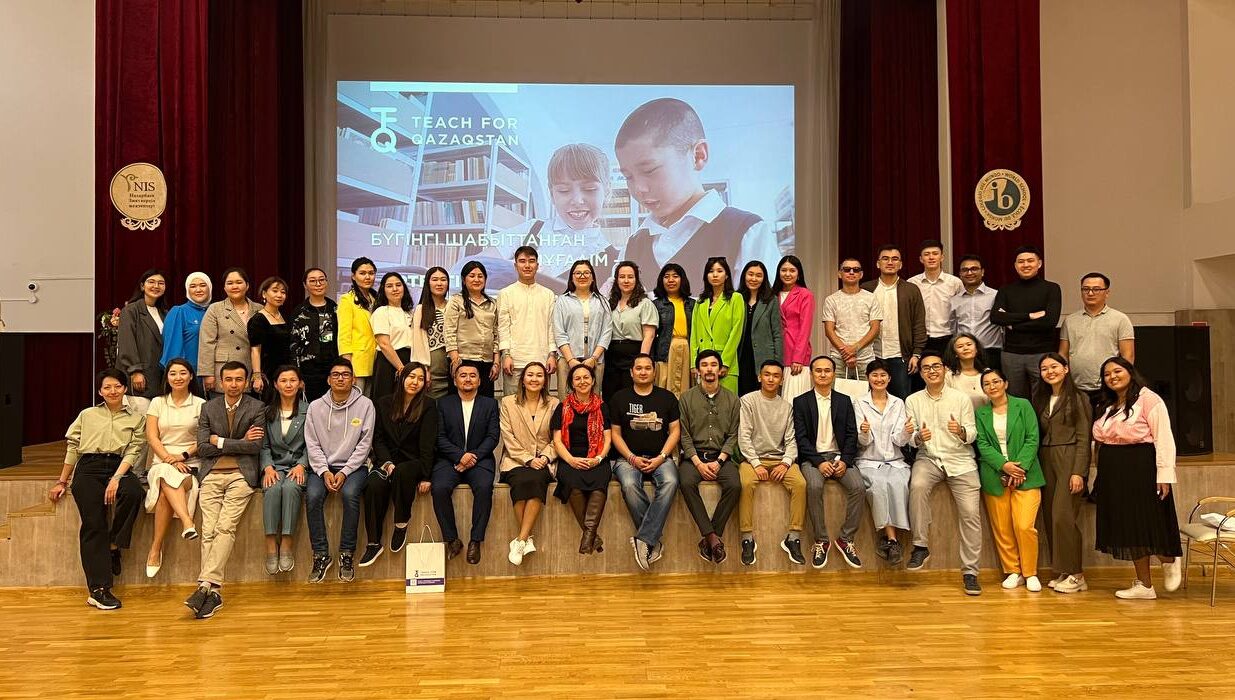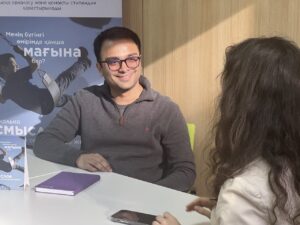ASTANA – Teach for Qazaqstan (TFQ) program with a mission to raise educational standards and reduce the gap between rural and urban education selected its first 49 finalists who will enroll in rural schools starting in September, reported TFQ press service.

Teach for Qazaqstan welcomed its first 49 finalists who will undergo pedagogical retraining. Photo credit: TFQ press service.
Launched in January, the program received over 3,000 applications. After a thorough selection process and stiff competition, 49 finalists were determined in May who are enrolled in online pedagogical retraining. In July and August, the finalists will undergo offline training at Suleyman Demirel University in Almaty.
As part of the program, TFQ cooperates with educational experts from the Teach for All global network of 60 independent partner organizations working to build collective leadership for their countries.
Shoaib Alam, Teach For All Asia-Pacific regional director for network engagement, visited Kazakhstan on May 24-29. In an interview with The Astana Times, Alam shared his insights, experience and outlook on the development of the program in Kazakhstan.

Shoaib Alam, Teach For All Asia-Pacific regional director for network engagement during the interview with The Astana Times correspondent. Photo credit: TFQ press service.
“The program has been on an accelerated timeline. It started really, really well. We’re very excited to see the progress that Teach for Qazaqstan has made. I think it’s very impressive,” said Alam, commenting on the launch of the program in Kazakhstan.
After completing a two-month retraining program, the finalists will be placed at schools in the Karagandy Region, which has the highest urbanization rate in the country at 80%, according to the Kazakh Bureau of National Statistics.
Measured by the percentage of people living in the cities, Kazakhstan’s urbanization rate stands at 58.5%, official statistics show.
Urbanization is the cause of a large outflow of specialists. The children’s development is also affected by constant internal migration, manifested by the absence of an adult in the life of the child due to parents leaving to earn money and changing teachers.
Official figures reveal that of 7,637 schools in Kazakhstan, eight out of 10 are rural schools. Yet, 56% of all students attend urban schools, which increases educational inequality.
Coupled with underdeveloped infrastructure, outflow of staff and understaffing of schools, this educational divide leaves children from rural schools behind their urban fellows.
TFQ is committed to addressing this imbalance by engaging the brightest Kazakh graduates in a mission to raise standards and aspirations in rural schools.

TFQ is committed to addressing this imbalance by engaging the brightest Kazakh graduates in a mission to raise standards and aspirations in rural schools. Photo credit: TFQ press service.
The program’s CEO Gulnara Salmen discussed the origins of the initiative and its overarching mission in an interview with The Astana Times.
It is not easy to predict what global challenges might come around the corner, but when it comes to education, school leaders can build a solid platform for their students to be able to face those challenges, according to Alam.
“What I can observe is that the world is changing really, really fast and Central Asia as a region is also navigating a lot of those global challenges and changes. So I think for this region, as in many other parts of the world, one of the big questions is how do we prepare children and citizens for the future?” said Alam.
“At the same time, Central Asia, in particular, and many other countries are seeing a demographic divide. There is a large youth population and so there is a question around how do countries leverage that youth population for its long-term development and growth?” he added.
According to Alam, Teach for All is deeply adapted to local needs.
“In Teach for All we work alongside partners in addressing the questions that are most pertinent to their education ecosystems. So when we work with Teach For Qazaqstan, here, for instance, we take Teach for Qazaqstan’s lead and support this organization as Teach for Qazaqstan approaches the challenges that the education system faces here,” said Alam.
“The purpose of the visit is to learn the work that the organization has done. And so we’re here to identify moving forward where we might be able to support Teach for Qazaqstan as well as learn from what it’s doing already,” he added.
“I think one suggestion I’ve had for any network partner organization is to really think about the context of their country and their education ecosystem, which I think Teach For Qazaqstan is doing really, really well. My suggestion would be to continue to do that, really rooting for the work in the context of communities of one’s own country. I think that is what makes the network really, really powerful,” said Alam.
For Alam, a Colorado State University graduate who joined Teach for Bangladesh a decade ago, it is personal. Not only has he seen the impact the organization can make on education in his region, but he was inspired to contribute to the global impact Teach for All can make.
“I was seeing multiple challenges in Bangladesh’s education ecosystem. One of the things I was seeing is high levels of youth unemployment in my country, largely because a lot of young people were leaving school and university without some of the skills they needed to be competitive in the job market,” said Alam.
Once he became a Teach for Bangladesh member, he shifted his focus from regional to global effective engagement, which led him to move to leadership positions within the organization.
“When I heard about Teach for Bangladesh’s approach and model, all of the different things that I was noticing as challenges, it seemed like Teach for Bangladesh had a really interesting and unique answer to those challenges. So I initially joined as an intern, just trying to learn what the organization does, and then ended up working with the organization for about a decade, and so worked my way up to becoming the chief of staff there,” he said.

